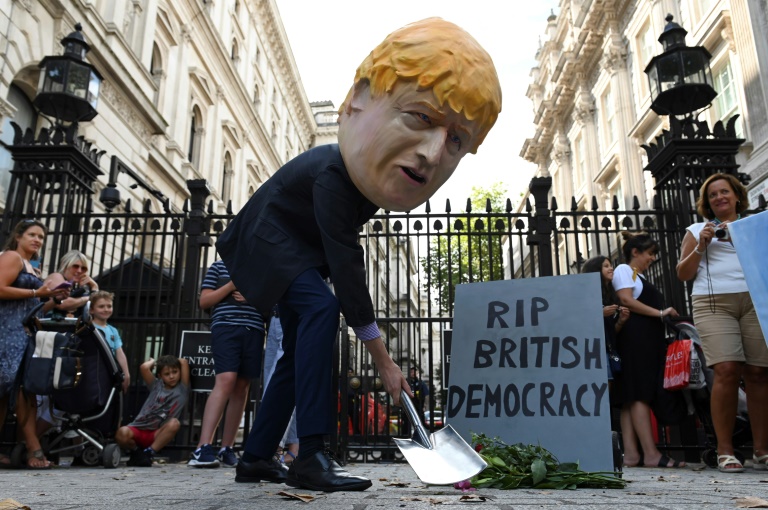
Demonstrators decried Boris Johnson's suspension of parliament weeks before the Brexit cutoff date.(Photo: AFP)
UK Prime Minister Boris Johnson's suspension of parliament just weeks before Britain's EU departure date faced legal challenges on Thursday following a furious outcry from pro-Europeans and MPs opposed to a no-deal Brexit.
Johnson announced the surprise decision Wednesday to dismiss parliament -- known as proroguing -- next month for nearly five weeks, claiming it was necessary to allow him to press reset and pursue a "bold and ambitious" new post-Brexit domestic agenda.
But the move sent shockwaves through the British political system, which relies on centuries of precedents and conventions instead of a codified constitution.
In a blow for Johnson, popular Scottish Conservative leader Ruth Davidson stepped down after eight years during which she has revived her party's fortunes.
Davidson, who supported staying in the EU, urged Johnson to clinch a deal with Brussels and mentioned the "conflict I have felt over Brexit" in her resignation letter.
Johnson's opponents have labelled the suspension of parliament a "coup" and a "constitutional outrage".
'Candyfloss of outrage'
The move prompted immediate court bids in London, Edinburgh and Belfast to halt the process.
Gina Miller, a businesswoman and leading anti-Brexit campaigner, has applied for an urgent judicial review in London challenging "the effect and the intention" of the suspension.
"We think that this request is illegal," said Miller, who in 2017 successfully won MPs the right to vote on formally starting to leave the EU in a court challenge.
In Scotland's highest civil court, 75 parliamentarians are seeking an interim interdict that would halt Johnson's move.
"It's the advice underlying yesterday's order which we impugn," said Scottish National Party politician Joanna Cherry, who is heading the push.
Meanwhile campaigner Raymond McCord launched a legal bid in Belfast to block Johnson's move, with a hearing set for Friday.
"He's obviously trying to circumvent parliament and we say in the context of Northern Ireland that is unconstitutional," McCord's lawyer Ciaran O'Hare told AFP.
However, arch-Brexiteer minister Jacob Rees-Mogg defended the parliamentary suspension and insisted MPs would still have time to debate Brexit ahead of Britain's October 31 EU departure date.
"The candyfloss of outrage, which is almost entirely confected, is from people who never wanted to leave the European Union," he told BBC radio.
'Stop the coup'
Thousands of people protested in London, Manchester, Edinburgh and other cities, while an online petition seeking to block the decision had garnered more than 1.4 million signatures on Thursday.
At the biggest rally, crowds gathered near parliament in London chanting "stop the coup" and waving EU flags.
General protests are planned outside parliament and around Britain on Saturday.
The main opposition Labour Party's leftist faction Momentum urged members to "occupy bridges and blockade roads".
Meanwhile leftists will rally outside parliament on Tuesday demanding an immediate general election.
Queen Elizabeth II approved Johnson's request to end what has been the longest session of parliament in nearly 400 years in the second week of September and reopen it on October 14 -- just over two weeks before Brexit.
The House of Commons typically goes into recess around the annual party conference season, which kicks off on September 14 and ends on October 2, but critics slammed this lengthier break.
Labour leader Jeremy Corbyn is mulling a no-confidence vote in Johnson's government, which commands a majority of just one seat.
The pound was stable on Thursday after sliding on news of the suspension.
Backstop or bust
In the seismic 2016 referendum on Britain's EU membership, 52 percent voted in favour of leaving the bloc -- a result that has left parliament and the country bitterly divided.
Johnson insists Britain must leave by the October 31 deadline -- already twice-delayed -- with or without a divorce deal from Brussels.
Parliament has rejected three times the withdrawal agreement struck between Brussels and the government of Johnson's predecessor Theresa May.
Eurosceptics objected to a so-called "backstop" provision to guarantee keeping the Irish border open for people and goods, which would keep Britain closely aligned with the EU.
Johnson, who took office barely a month ago, wants the EU to drop the backstop entirely -- something Brussels has repeatedly ruled out.
An EU summit on October 17-18 will likely determine whether there is any scope for compromise.
If not, Britain will end its four decades of membership without a deal governing key issues such as future trade relations and citizens' rights.


